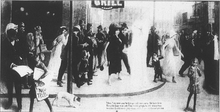Austin Cooper (artist)
Austin Cooper (1890–1964) was a Canadian–British illustrator and commercial artist. His work included cover illustrations for the Radio Times (including the 1935 Christmas edition)[1] and posters for the London and North Eastern Railway, Indian State Railways, the Empire Marketing Board,[2] London Transport, and the General Post Office. Examples of the latter are now in the collections of London Transport Museum[3] and the British Postal Museum.[4]
| Austin Cooper | |
|---|---|
| Born | 5 March 1890 Souris (Canada) |
| Died | 1964 |
| Alma mater | |
| Occupation | Illustrator, artist, designer |
| Branch | The Black Watch (Royal Highland Regiment) of Canada (–1919) |
Career
Cooper was born in Souris, Manitoba, Canada,[5] on 5 March 1890,[6] the son of an Irish farmer.[7] Cooper studied at the Cardiff School of Art, and then the Allan-Frazer College of Art in Arbroath.[7]

He began his career as a commercial artist after returning to Calgary,[7] at a commercial art studio alongside fellow Arbroath student Adam Sherriff Scott. The two produced a 4 m × 2 m (13.1 ft × 6.6 ft)[8] painting "Christ in Calgary" (1913; thought lost),[9] which was exhibited unsigned at the Royal Picture Gallery there for six months, described by the Calgary News-Telegram (one of whose street-vendors was depicted in the painting[8]) as showing:
A crowd of hurrying people is on the street hurrying west on the side and corner near the old Royal hotel, and intermingled with this crowd is the Indian, the squaw with her child in a papoose, the lady stenographer with her beau; the lumberman chatting with his companion on the corner, and, leaning up against the wall of the hotel; the policeman talking to a nurse and taking notes on an accident; the mother and her little girl; the Negro standing unconcerned, and other characters; but the most prominent character in the picture is a large representative figure of Christ standing on the corner of the pavement, while directly in front of him and looking up into his face with a frightened look is a woman of the street, bearing all the characteristics of such a woman, and dressed in red.
On being identified as one of the artists Cooper's only comment, to a newspaper, was "We have nothing to say about it except what appears on the canvass".[8] Subsequently, he and Sherriff-Scott set up their own company, Shagpat Studios, in Montreal.[9]
During World War I he was in Flanders with the Canadian Black Watch, rising to Regimental Sergeant Major, before being discharged in 1919. He moved to London in 1922,[5][7] having met his wife-to-be there.[9]
From 1936 to 1940, he was principal of the London branch of the Reimann School of Commercial and Industrial Art.[5]
Later in his career, in 1943, he gave up commercial art for abstract painting.[5] His first solo exhibition was held in 1948, at the London Gallery.[5] Several of his abstract works are in the collection of the Tate Gallery.[10]
He died in 1964.[5]
Bibliography
- Making a Poster. The Studio. 1939.
References
- "Radio Times Issue 638". BBC Genome. Retrieved 31 December 2017.
- "Austin Cooper". Meibohm Fine Arts. Retrieved 31 December 2017.
- "The collection". LTM. Retrieved 31 December 2017.
- "Austin Cooper". British Postal Museum. Retrieved 31 December 2017.
- "Austin Cooper". visualarts.britishcouncil.org. British Council. Retrieved 31 December 2017.
- "Austin Cooper". Tepapa. Retrieved 31 December 2017.
- Douglas, Ava. "Austin Cooper". Retrieved 31 December 2017.
- Bly, David (23 January 2004). "Christ in Calgary painting stirred controversy". Calgary Herald. p. B4.
- Salter, Colin (7 November 2015). "Austin Clare Cooper (1890–1964) and the Calgary Christ". Retrieved 31 December 2017.
- "Austin Cooper 1890–1964". Tate Etc. Retrieved 1 January 2018.
Further reading
- Cooper, Austin; Ray, Timothy (1993). Imponderable Joys: the Work of Austin Cooper. Art Gallery of Southwestern Manitoba. ISBN 9780969762201.
External links
- Austin Cooper (1890–1964) and the Art Of The Poster – 2010 blog post with photograph of Cooper